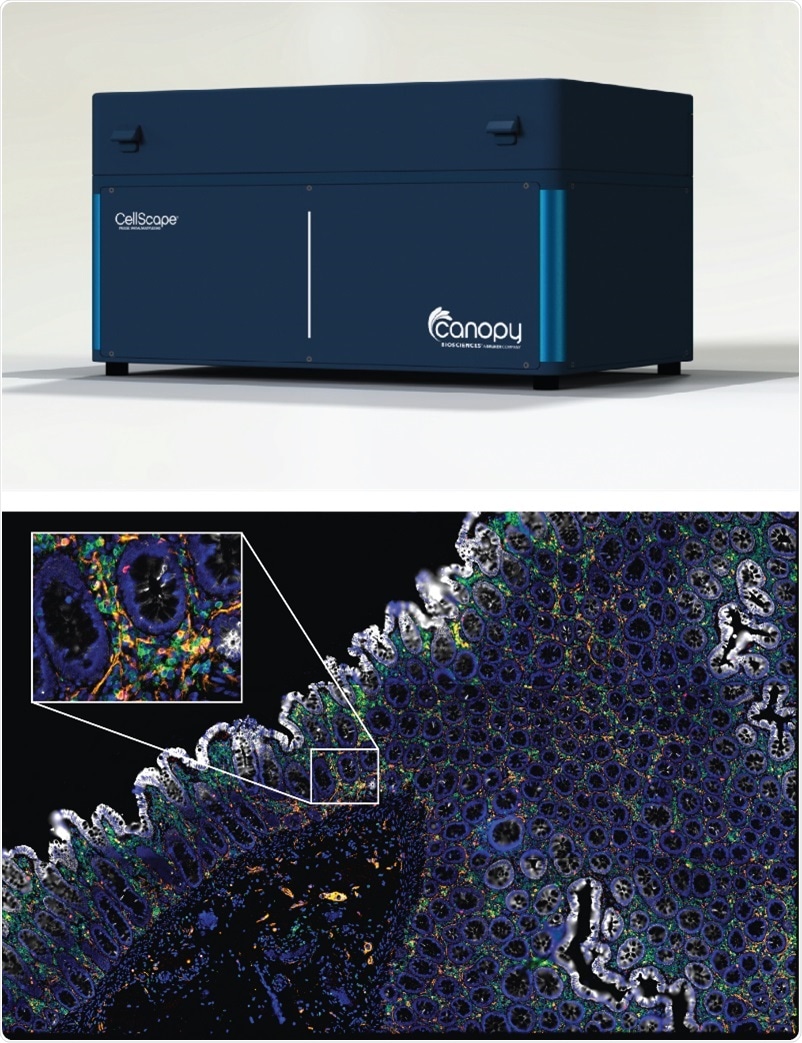Canopy Biosciences, a Bruker Company, today announced the commercial launch of the CellScapeᵀᴹ system, the next generation in ChipCytometryᵀᴹ instrumentation, advancing the cutting-edge for quantitative in situ spatial phenotyping. ChipCytometry delivers single-cell targeted spatial proteomics for complex whole-tissue analysis of the tumor microenvironment, as well as deep immune profiling for applications in immunology, neuroscience, and infectious disease.

CellScape instrument for high-plex, targeted spatial proteomics (top). High-plex image of FFPE colorectal tissue stained and imaged with ChipCytometry (bottom). Inset shows magnification with subcellular resolution. Image Credit: Canopy Biosciences, a Bruker Company
The new benchtop CellScape system builds on the existing core strengths of the original ChipCytometry instrument, the ZellScannerONEᵀᴹ, which has enabled spatial biology research with sub-cellular resolution and a large field of view suitable for whole slide pathology imaging, on both tissue samples and cell suspensions since 2016. The CellScape system, with its multiplexed fluidics integration, adds complete walk-away automation, improved optical performance, sub-cellular resolution and massively increased throughput for whole slide imaging of millions of cells, while maintaining the key features of the core ChipCytometry technology, including high‑plex phenotyping with single‑cell resolution, very high dynamic range imaging for detection and quantification of both high- and low‑expressing targets, and compatibility with standard commercially available fluorescently labelled antibodies, requiring no proprietary antibody conjugation. This powerful combination of features will significantly improve researchers’ workflow, accelerate spatial biology discovery, and drive broader adoption of high-plex spatial omics for translational and clinical applications.
The ChipCytometry platform has been a great tool for us in developing high content staining approaches for in-depth spatial immune profiling of human tissue samples. The improvements to throughput and automation of the CellScape system gives the opportunity to scale up studies and explore larger cohorts – and accelerate studies aimed at improving patient care.”
Paul Klenerman, Ph.D., Professor of Gastroenterology, The University of Oxford.
Following the acquisition of Canopy Biosciences by Bruker in 2020, we were able to leverage Bruker’s advanced fluorescence microscopy expertise to design the CellScape instrument as an integrated, multiplexed imaging system that is highly optimized for the application of high-throughput quantitative spatial omics with sub‑cellular resolution. The improved optical performance of the system builds on the high resolution and high dynamic range that was already best‑in‑class with our ChipCytometry technology.”
Thomas Campbell, Ph.D., Product Manager, Canopy Biosciences.
About the CellScape instrument
Through enhanced optics and automation, the throughput of CellScape is markedly improved compared to the previous generation of ChipCytometry instrumentation. Combined with multi-sample automated processing, which is available standard with every CellScape, the platform will have among the highest throughput of any highly multiplexed spatial proteomics system available today. CellScape will also be available with an optional FalconFastᵀᴹ configuration, which provides an even greater increase in throughput, bringing into reach large-scale clinical studies that have previously not been possible at a high plex. For more information about CellScape, visit www.CanopyBiosciences.com/CellScape